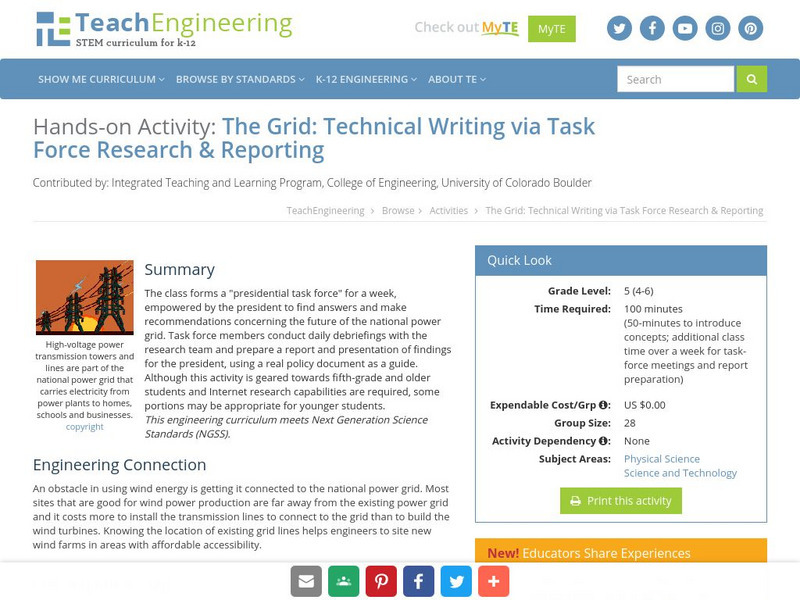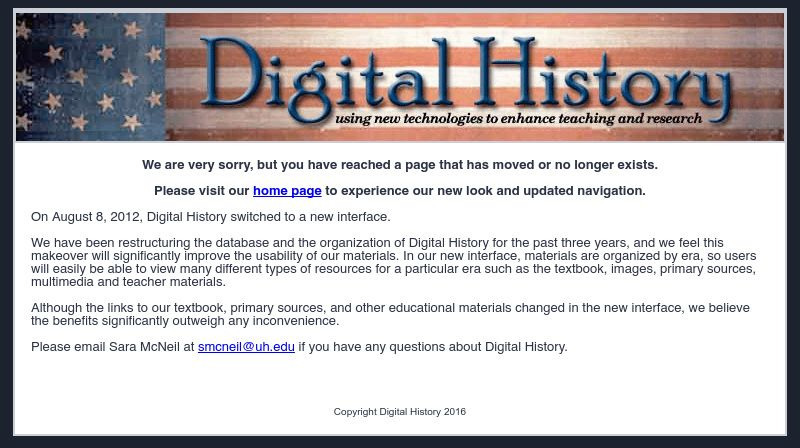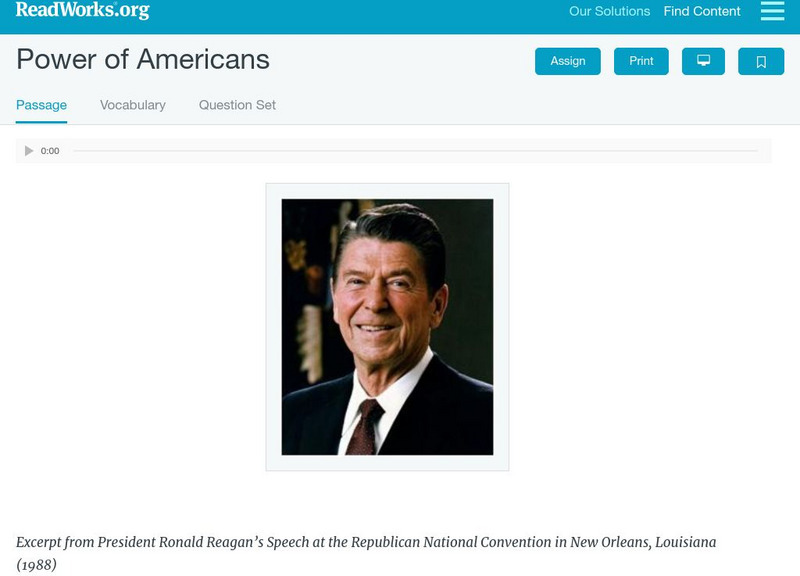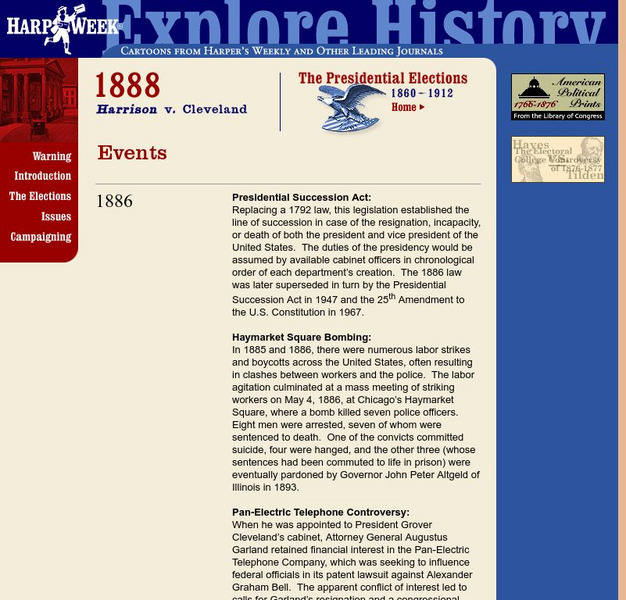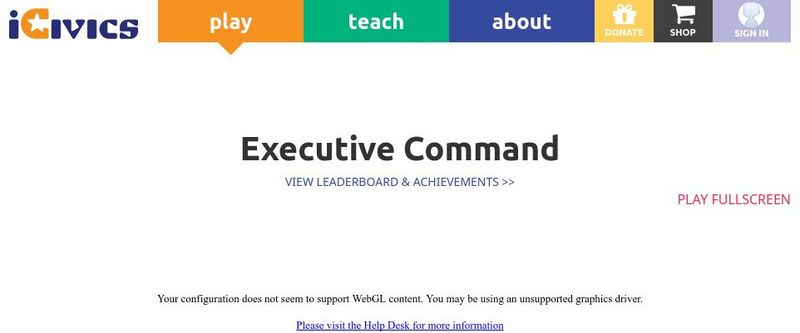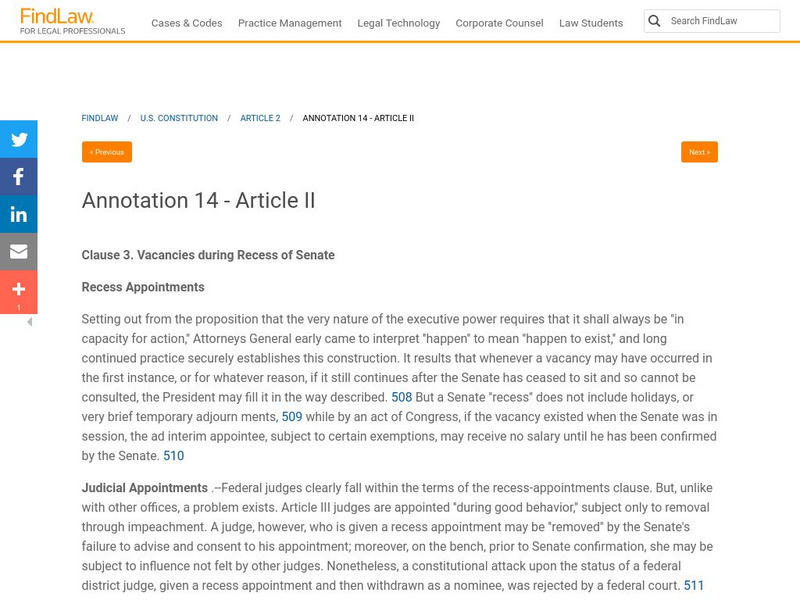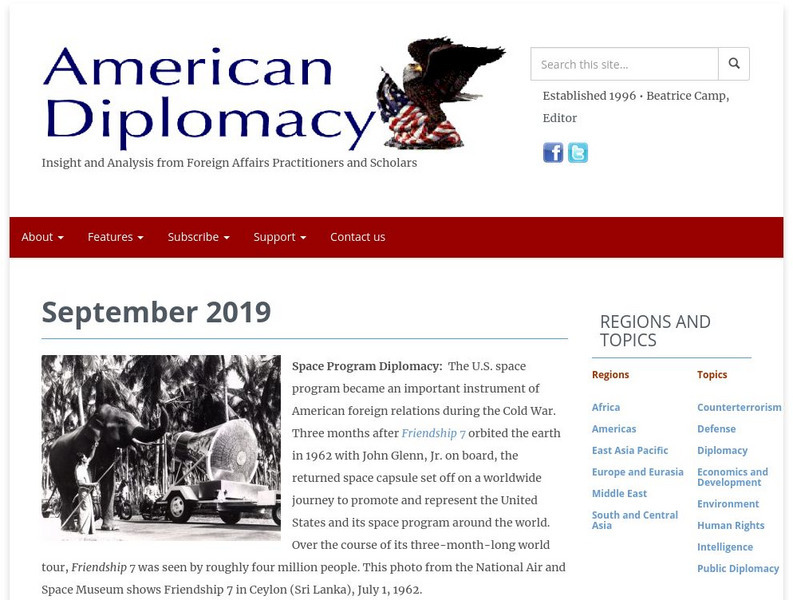Hi, what do you want to do?
iCivics
I Civics: Mini Lesson: Pardon Power
Lesson teaches about presidential pardons, commutations, and the limitations of these powers.
A&E Television
History.com: How John Marshall Expanded the Power of the Supreme Court
When John Marshall was appointed chief justice of the U.S. Supreme Court in 1801, the nation's highest court occupied a lowly position. There was no Supreme Court Building in the newly completed capital, Washington, D.C., so the six...
Thomson Reuters
Find Law: Article Ii: The Creation of the Presidency
A scholarly discussion of Article II of the U.S. Constitution, which establishes the executive branch of the U.S. government. Discusses the origin of the article and the debates on executive power that took place among the Founding...
Smithsonian Institution
National Museum of American History: American Presidency: A Glorious Burden
Review the lives and careers of the presidents (current through 2001), particularly the burdens that the office imposes, by examining documents and artifacts that clarify the powers of the office, the role of presidential campaigns, life...
Other
Presidents & the Constitution: War: Commander in Chief
The President of the United States has many powers. This site provides an extensive overview on the President's role as Commander in Chief and includes a video.
Wikimedia
Wikipedia: President of the United States
This is a comprehensive article on the presidency of the United States. Learn about the history of this office, its responsibilities and its powers.
Yale University
Avalon Project: Constitution of the United States: Article Ii
Read the text of Article II of the Constitution, the four sections of which lay out the powers and duties of the executive branch of the federal government.
US National Archives
Nara: Teaching With Documents: The Treaty of Guadalupe Hidalgo (Activity)
The National Archives and Records Administration (NARA) provides a lesson, focusing on the treaty of Guadalupe Hidalgo, that relates to the power granted to the President and the Senate to make and approve treaties with foreign nations...
Edutopia
Edutopia: Presidents' Day: A Life Lesson for Students
With this resource, teachers can lead students in a topical conversation regarding President's Day. This free-form lesson includes suggested questions and encourages student discussion about the powers and responsibilities of the...
TeachEngineering
Teach Engineering: The Grid
The class forms a "Presidential Task Force" for a week, empowered by the president to find answers and make recommendations concerning the future of the national power grid. Task force members conduct daily debriefings with their...
Khan Academy
Khan Academy: Federalist No. 70
This study resource from Khan Academy discusses the Federalist No.70. This information is intended for students taking high school or college level American Government and Civics courses, including the AP Government course.
Digital History
Digital History: The Clinton Presidency
Short, but comprehensive, synopsis of Clinton's two terms as president. Included in the article is the 1992 campaign, successful and controversial legislation, and the scandals that would eventually become part of his presidential legacy.
Center For Civic Education
Center for Civic Education: What Is the Role of the President?
The president has great power granted to him under Article II of the Constitution, while at the same time extensive limits have been placed to keep that power in check. This source contains extensive background on these powers and...
US Government Publishing Office
Ben's Guide to u.s. Government: The President of the United States (9 12)
Summarizes the role of the President as the Head of the Executive Branch and the powers and duties assigned to him by the Constitution. Provides links to further information.
Social Studies for Kids
Social Studies for Kids: The Presidential Veto
The President of the United States has extraordinary power over the shaping of federal laws. He or she can veto any law passed by Congress.
Read Works
Read Works: Power of Americans
[Free Registration/Login Required] An excerpt form a speech given by President Ronald Reagan at the Republican National Convention in 1988. A question sheet is available to help students build skills in reading comprehension.
Harp Week
Harp Week: The Presidential Elections: Events
Read about the domestic policies and events that occured in Grover Cleveland's first term of office. Many of these were events on which he would run as he sought his second term.
iCivics
I Civics: Games: Executive Command
Have you ever thought about being president? Executive Command gives you four years in office to accomplish your legislative and policy goals. You'll make a state-of-the-union address, work with your aides and cabinet, try your hand at...
Other
The Official Site of the President of Russia
Official Russian information on the President of Russia. Find speeches given by the president, news and announcements related to the president, and information about presidential meetings. Also information about the authority and duties...
PBS
Pbs News Hour: Nixon Tapes
Transcript of Margaret Warner's interview with Stanley Kutler on his book, Abuse of Power, detailing the sections of the Nixon tapes which show the President's misuse of constitutional power, resulting in his impeachment. Insights into...
iCivics
I Civics: For the President, All in a Day's Work
Students learn the primary responsibilities of the president and how those duties connect to the powers the Constitution grants to the Executive Branch.
Thomson Reuters
Find Law: Article Ii: Recess Appointments
Explains Clause 3 of Article II, Vacancies during Recess of Senate. It outlines various situations where a vacancy may occur and what rules are in place to deal with it.
Thomson Reuters
Find Law: Article Ii: The President as a Law Enforcer
Read Section 3 of Article II which explains what the President's duties are as Law Enforcer. The Constitution does not state that the President shall execute the laws himself, but that he will ensure that laws are "faithfully executed."
University of North Carolina
University of North Carolina Chapel Hill: American Diplomacy
An on-line magazine that provides "Commentary, Analysis, and Research on American Foreign Policy and Its Practice." Also contains articles from actual ambassadors and diplomats in the Foreign Service.











